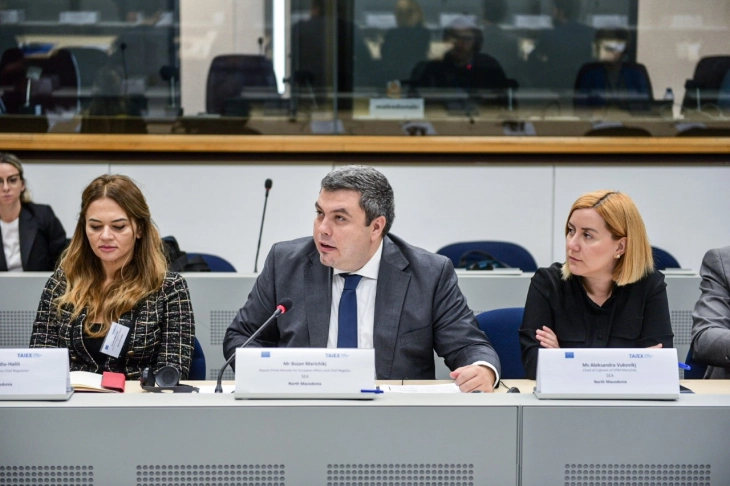Screening expected to accelerate reforms, says Marichikj in Brussels

Skopje, 15 September 2022 (MIA) - Deputy Prime Minister for European Affairs and Chief Negotiator Bojan Marichikj in an opening address at the first screening meeting welcomed the official start of the practical part of the accession negotiations after the first Intergovernmental Conference with the European Union, held in July.
"Negotiations transform the country for the better. After waiting for 17 years, we have a historic chance to provide European future for the citizens and for North Macedonia," said Marichikj adding that the country with the start of the screening process enters deeper into the reform process, which includes implementation of European regulations and contributes to Europeanize the society and introduce European functioning of the country.
Speaking before European Commission representatives, the Deputy PM said North Macedonia has laid the foundations to move ahead with a good tempo stressing that everyone are fully focused on every chapter in order with dedication and optimism to meet the national strategic goal - EU full-fledged membership, the Secretariat for European Affairs said.
"The Macedonian team here in Brussels and our colleagues watching us in Skopje are prepared to listen to your experiences and advice on how to best meet the demands of the EU legislation in the public procurement section, a chapter that is part of the Fundamentals cluster," said Marichikj.
Speaking in Macedonian, the Deputy PM also presented North Macedonia's achievements in the public procurement chapter saying that the legal framework for public procurement is largely aligned with the EU's laws.
"In early 2022, the government adopted the strategy for improving the public procurement system for the period from 2022 to 2026 with a 2022 action plan for its implementation. The defense and security directive 2009/81/EC has been transposed into the law on public procurement in the area of defense and security," said Marichikj.
The Deputy PM said that activities for establishing effective public and private partnerships are under way and that the new bill on public and private partnership has been prepared aiming at transposing the 2014/23/EU directive for awarding concession contracts. The bill is in final stages and is to be sent to the government.
The e-public procurement system functions efficiently, said Marichikj, and the development of a platform for e-market, e-catalogs and further improvement of the system processing complaints for public procurements is under way.
"The role and capacity of the State Audit Office to audit public procurements have been improved through the implementation of a new program for public procurement audits, which provides updated directions and methodological tools for auditors," explained Marichikj adding that the legislation regarding legal remedies has been largely aligned with the EU laws.
"We haven't waited to open the negotiations without working on the concrete chapter. We are aware that a lot of hard work is ahead as well as commitment to reforms, and the government of North Macedonia has demonstrated it has political will and capacity," Deputy PM Marichikj concluded.
Thursday marked the start of the EU screening process with North Macedonia and Albania. Meetings will take place on September 15-27 about the areas and chapters from the cluster Fundamentals, when the Commission is scheduled to present the new legislation in these areas. Meetings are taking place in Brussels all but the meetings about the Chapter 18 Statistics, which are in Luxembourg.
Explanatory meetings about this cluster will be held until September 27. Bilateral screening will follow from November 11 until December 9, when North Macedonia should present the level of alignment with the EU legislation, institutional structure tasked with implementing the aligned laws and plans for further alignment, building of institutional and administrative capacities as well as the necessary human, financial and IT resources for implementing European standards. Afterwards, the European Commission should prepare a report on the screening, which among other things contains findings and evaluation by the Commission on the level of alignment, capacities and conclusions and recommendations, said the Secretariat for European Affairs.







